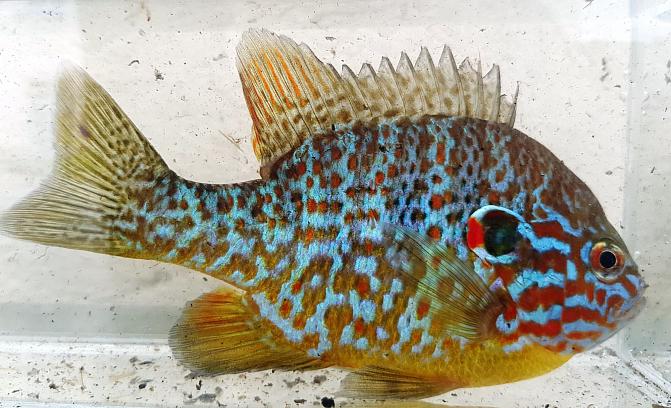A fish released from an aquarium into nature may be an invasive alien species
The Natural Resources Institute Finland (Luke) has investigated risks associated with 17 invasive alien species classified to be harmful in the EU, the ways in which they spread and their range, and prepared proposals for control measures. Of these species, populations of pumpkinseed, known as a fish species living in aquariums, have increased in Finland’s nature.
The list of invasive alien species of Union concern includes various aquarium fish and plants, as well as garden plants. Due to Finland’s location in the north, not all listed species are necessarily harmful here, as our conditions restrict their becoming established and their spread. Nevertheless, the Member States must prepare management plans for all listed species, especially to eliminate widely spread alien species or to prevent them from spreading, so that the species cannot reproduce, cause harm or spread to other Member States.
“Invasive alien species” means animals, plants and other organisms that have spread outside their natural geographic range, partly due to people’s intentional or unintentional activities. Some invasive alien species have been found to be harmful, threatening biodiversity or related ecosystem services.
As an extension to previous management plans for invasive alien species, Luke most recently (15 August 2019) investigated risks associated with 17 harmful invasive alien species added to the EU list, the ways in which they spread and their current range, and prepared proposals for the control measures required. Of the species added to the updated list, only pumpkinseed has become established in our nature.
In the investigation, it was identified that populations of pumpkinseed, known as a fish species living in aquariums, have spread over a much larger area than what was originally believed. The species was found in at least nine municipalities in Southwest Finland.
“We saw that pumpkinseed reproduces effectively in nature, and its populations are increasing in most ponds. It is assumed to become harmful when the fish density increases. Pumpkinseed is a significant competitor and threat to native species”, says Lauri Urho, senior scientist at Luke.
In other parts of Europe, it has been found that, when released into nature, pumpkinseed causes competition over nutrition and decreases in the populations of several different groups of organisms, ultimately reducing biodiversity.
The prepared management measures propose that pumpkinseed populations be removed from all ponds in which this is possible with reasonable resources. In other populations, the number of individuals should be limited so that they do not cause any significant harm.
“We also hope that, by providing information about the threats caused by the species and the importance of following regulations, we can put a stop to the intentional spread of the species”, Urho says.
Of the other species included in the investigation, the tree of heaven, Japanese hop and Senegal tea have occasionally been used as horticultural crops or aquarium plants in Finland. According to the EU list, the sale and growing of these species are prohibited, and they cannot be allowed to spread in nature. It is also important to provide information about this and any harms caused by invasive alien species.
The scientists hope that all observations of invasive alien species were registered on the vieraslajit.fi website.




